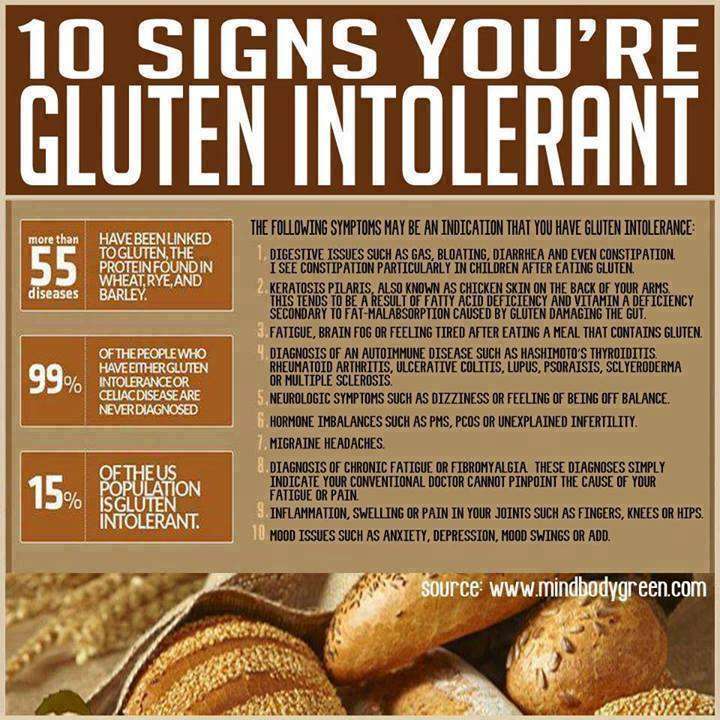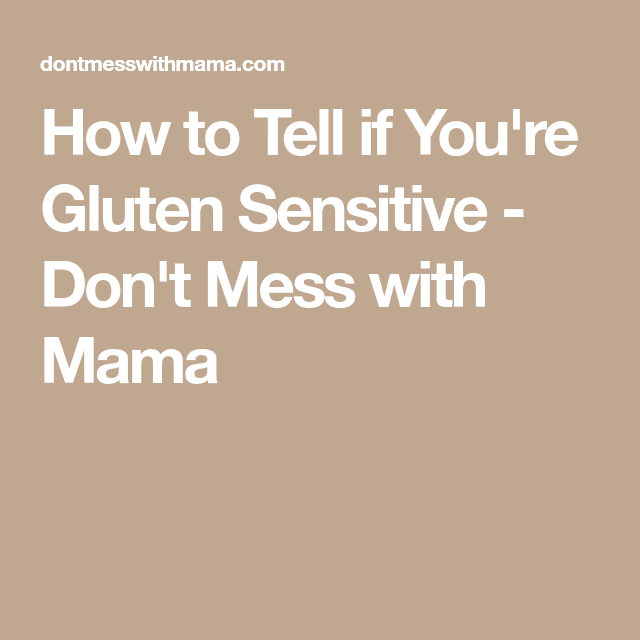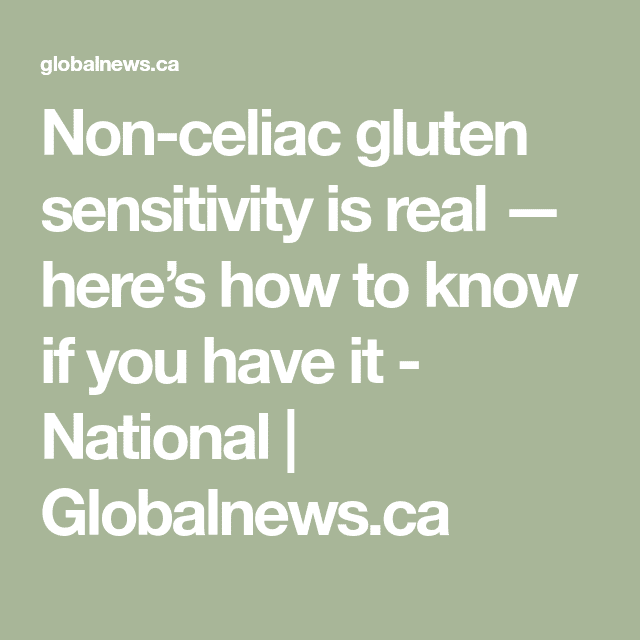Getting A Proper Diagnosis Is Key
Getting a proper diagnosis is the first step toward feeling better and living a healthy life. Diagnosing celiac disease is pretty straight forward. A gastroenterologist will be able to make a diagnosis based on blood tests and a biopsy of the small intestine.
Diagnosing non-celiac gluten intolerance is a little trickier. Your physician will test you for celiac disease, wheat allergy and other things that might be associated with your particular symptoms. If you test negatively for those things, youll start a gluten-free diet. If going gluten-free for a while improves your symptoms, youll probably be diagnosed with non-celiac gluten intolerance.
If you think you might have a gluten intolerance, its important to keep gluten in your diet until you visit your physician. This is the only way the to test properly.
How To Test For Gluten Allergy
There are three different tests available to confirm a gluten allergy. The easiest is a skin prick test where a gluten solution is placed on the back of your hand and the allergist looks out for a reaction.
The formation of raised, red spots in 20 minutes or less usually indicates an allergy. The allergist can also use a blood test to identify certain markers in your body that can indicate you have an allergy.
You May Also Like
Another benefit of the blood test is that the doctor can determine if you have other conditions such as celiac disease.
Finally, you can undergo a food challenge while under observation. This challenge will include eating gluten-based foods while the allergist looks out for a reaction.
Diagnosing a gluten intolerance can be a little trickier as there is no definitive test for it, Instead, your doctor may use different things to rule out other conditions that can cause the same symptoms. For example, celiac disease and irritable bowel syndrome can often cause the same digestive issues as gluten intolerance.
How Is Celiac Disease Treated
Celiac disease is treated by not eating gluten. This can be hard because gluten is in many foods, but a dietitian can help adjust someone’s diet to cut out gluten. It is important not to start a gluten-free diet unless you are truly diagnosed with celiac disease.
Following a gluten-free diet allows the small intestine to heal. But that doesn’t mean the person can start eating gluten again. For someone with celiac disease, gluten will always irritate the intestines and, if this happens, the diarrhea, belly pain, and other problems will return.
If you’re diagnosed with celiac disease, it can be a challenge to learn which foods contain gluten. You may not be able to remember them all, but you can keep a list with you and ask about menu items at restaurants before digging in. Before you know it, you’ll be a pro at knowing which foods are safe and which are not.
Don’t Miss: Do Allergies Feel Like A Cold
Whats The Difference Between Gluten Sensitivity And Celiac Disease
Celiac disease is an autoimmune condition triggered by gluten. People with celiac disease have intestinal damage when they eat gluten. People who are gluten intolerant, while they may experience symptoms similar to those with celiac disease, do not have the intestinal damage or antibodies found in those with celiac disease.
New research indicates that gluten could cause brain damage in people with gluten intolerance, although more research is needed to confirm this.
Recommended Reading: Is Best Foods Mayo Gluten Free
What Kinds Of Health Risks Do People Allergic To Gluten Face

Gluten intolerance, celiac disease, and gluten allergy are all conditions that can cause a variety of reactions, ranging from minor to severe. For people with gluten intolerance, even a small amount of gluten can cause problems. Celiac disease is the most serious gluten-related condition and can lead to malnutrition, weight loss, and even death if left untreated. Wheat allergy is the most common food allergy in children and can cause a range of symptoms, from mild to life-threatening.
There are many treatments that people can receive immediately, including injections of epinephrine and antihistamines like Benadryl can help to stop the allergic reaction. If you are experiencing any gluten allergy symptoms, then it is important to see a doctor right away. Celiac disease is a serious gluten allergy that can lead to malnutrition and other health problems if left untreated.
Don’t Miss: What Does An Allergy Pill Do
What Is The Difference Between A Wheat Intolerance And A Gluten Intolerance
Gluten proteins are found within wheat. That means that those who are gluten intolerant are also wheat intolerant. However, it doesnt work the other way around.
Gluten is found in other grain substitutes such as barley and rye, so those with a specific wheat intolerance who do not react to gluten proteins can still eat these foods without experiencing a reaction.
Supermarkets have continuously expanded their range of gluten and wheat-free produce in recent years to cater for those who are following a gluten-free diet or avoiding wheat.
Respiratory complaints
Read Also: Sams Choice Gluten Free Bread
Gluten Allergy Symptoms You Should Know
Its unlikely that youll experience all the symptoms of an allergy or intolerance but there are a few that are common.
Its also important to note that an allergy can present itself within an hour or so of eating gluten.
You May Also Like
However, it can take up to a few days for the symptoms of gluten intolerance to become apparent.
Common symptoms of gluten allergy:
Get Ready for Those Fall Allergies With These Tips
Allergy Season: What to Have on Hand to Make Sure Youre Fully Covered
Sudden Reaction to a Food? It Could Be Adult-Onset Allergy
7 Ways Youre Making Your Allergies Worse
Got Allergies? 6 Tips To Relieve Swollen Eyes
Also Check: Is Butterbur Good For Allergies
Diarrhea Constipation And Smelly Feces
Individuals with celiac disease experience inflammation in the small intestine after eating gluten.
This damages the gut lining and leads to poor nutrient absorption, resulting in significant digestive discomfort and frequent diarrhea or constipation (
That suggests that gluten exposure on its own may induce feelings of depression, irrespective to digestive symptoms.
The Key To Gluten Intolerance Testing
The key with these gluten intolerance test in the lab is you MUST be eating gluten for roughly 4 weeks prior to testing in order to detect gluten antibodies. That being said, if you know you dont tolerate gluten I do not recommend adding it back into your diet just to see what happens on a test.
If you are certain that gluten is to blame for your symptoms, I would avoid it no matter what any test says! In my experience, testing does not always have the most valid responses when compared to the gold standard of an elimination diet.
As I often told the patents in my clinic: Your body knows better than any test. If your symptoms disappear when you take gluten out of your diet and return when you add it back in even if you have a negative test result you still have an issue with gluten. So dont eat it
Don’t Miss: How To Make Allergies Feel Better
Do You Have Any Signs Or Symptoms Of Gluten Intolerance
Remember that a gluten intolerance only affects a small percentage of people.
That means going gluten-free only has health benefits for a select few.
But you may be one of them if you frequently experience one or more of the above signs and symptoms.
Always speak with your doctor or dietitian first before making any major dietary changes.
About Joe Leech, Dietitian
Joe Leech is a university-qualified dietitian from Australia.
He graduated with a Bachelor’s degree in exercise science, followed by a Master’s degree in Nutrition and Dietetics in 2011.
Learn more about him on the About page.
Joe Leech, Dietitian
Signs You’re Gluten Intolerant
More than 55 diseases have been linked to gluten, the protein found in wheat, rye, and barley. It’s estimated that 99% of the people who have either gluten intolerance or celiac disease are never diagnosed.It is also estimated that as much as 15% of the US population is gluten intolerant. Could you be one of them?
You May Like: Why Do Some People Have Pollen Allergies
Testing For Wheat Gluten Allergy
How Is Gluten Intolerance Diagnosed

Your healthcare provider carefully reviews your symptoms and medical history. If they suspect you have a gluten intolerance, these are the next steps to confirm the diagnosis:
- Step 1: You eat a diet containing gluten for about six weeks. During this time, your healthcare provider performs blood tests and skin tests to rule out a wheat allergy or celiac disease. There isnt a gluten intolerance test.
- Step 2: If you dont have a wheat allergy or celiac disease, your healthcare provider will ask you to exclude gluten from your diet for at least six weeks. Keep a thorough record of your symptoms during this time, noting which symptoms improve.
- Step 3: If your symptoms do improve while youre on a gluten-free diet, you gradually reintroduce gluten back into your diet. If symptoms return, you likely have a gluten intolerance.
Recommended Reading: Does Zinc Help With Allergies
Gluten Sensitivity May Be A Misnomer
Several studies suggest that most people who believe theyre gluten sensitive dont react to gluten at all.
One study put 37 people with irritable bowel syndrome and self-reported gluten sensitivity on a low-FODMAP diet before giving them isolated gluten instead of a gluten-containing grain like wheat (
SUMMARY
FODMAPs not gluten may be the cause of digestive problems in non-celiac gluten sensitivity. Some scientists believe that wheat sensitivity is a more appropriate name for this condition.
You May Like: Gluten Free Dairy Free Ice Cream Recipe
Dermatitis Herpetiformis: The Itchiest Rash Imaginable
It’s not unusual for a true allergic reaction to result in a skin rash, so it makes some intuitive sense to call dermatitis herpetiformis a “gluten allergy,” as it causes a remarkably itchy, persistent rash. But this rash is not the result of a true allergy: dermatitis herpetiformis is an autoimmune skin condition that occurs when you’ve eaten gluten grains. Symptoms include:
- Multiple small bumps that look like pimples
- Itching and burning
- Purple marks where bumps are healing
Dermatitis herpetiformis can occur anywhere on your body, but the most common locations for this rash are your buttocks, elbows, knees and on the back of your neck. If you’re about to have an outbreak, the itching usually starts even before you see the bumps appear. The condition is closely related to celiac disease and is associated with celiac disease.
You May Like: Can Food Allergies Cause Severe Stomach Pain
How To Go Gluten Free
Currently, researchers are determining if those with gluten sensitivity should go completely gluten free or maintain a low-gluten diet. Additionally, theyre evaluating which biomarkers help identify gluten intolerance for diagnostic reasons, with the hope of creating tailored treatment options.
Regardless of where the research currently stands, the first step to going gluten free entails ruling out celiac disease, Crohns, and other gut disorders. Afterward, follow an elimination diet. Its wise to consult a registered dietitian, who can help ensure your diets overall quality to reduce the risk of nutritional deficiencies, undesired weight loss, and poor energy intake. He/she can also help with the reintroduction phase, identify symptoms with food correlation, plus help navigate grocery shopping, recipe modifications, label reading, and social dining.
Is There A Food Intolerance Test
A number of companies produce food intolerance tests, but these tests are not based on scientific evidence and are not recommended by the British Dietary Association .
The best way of diagnosing a food intolerance is to monitor your symptoms and the foods you eat. See what happens when you cut out the suspected food for a while, and then reintroduce it into your diet.
Read Also: Are Allergies Bad In Tucson
Are Gluten Intolerance And Celiac Disease The Same Thing
Gluten intolerance and celiac disease are different. People with celiac disease have an autoimmune response to gluten. This means their bodies try to fight against gluten as if it were a virus. This reaction causes inflammation and damage to their digestive tracts. Celiac disease is the result of an abnormal gene. People with celiac disease also have high levels of certain antibodies in their blood, which are substances that fight gluten.
Gluten sensitivity and celiac disease cause a lot of the same symptoms. But people with gluten sensitivity dont have an abnormal gene or antibodies in their blood.
What Are The Signs & Symptoms Of Celiac Disease
Common symptoms of celiac disease are diarrhea, decreased appetite, stomachache and bloating, poor growth, and weight loss. Many kids are diagnosed with it when they’re between 6 months and 2 years old, which is when most kids get their first taste of gluten in foods.
For some people, the problems start slowly and the symptoms may be terrible one week and not as bad the next. Because of this, some people aren’t diagnosed with celiac disease until they’re older. The problem is chronic, which means that although symptoms may come and go, people who have celiac disease will always have it.
Someone with celiac disease may feel tired and could be irritable. Some also have skin rashes and mouth sores. The problem is sometimes mistaken for other digestiveproblems called inflammatory bowel disease orlactose intolerance. And in some cases, a kid won’t have any symptoms and then will all of a sudden start having problems during a time of stress, such as after an injury.
Recommended Reading: Is Sore Throat A Sign Of Allergies
What A Doctor Can Do
If youre experiencing unusual symptoms and believe you might have CD, GS, a wheat allergy or another digestive condition, reach out to your healthcare provider . Your doctor can help pinpoint what ails you, refer you to the appropriate specialists and begin treatment to alleviate your symptoms. Avoid self-diagnosing your condition or eliminating gluten from your diet before your appointment, which could influence your test results, leading to a misdiagnosis and slower recovery.
And if your tests results reveal that you do not have a digestive issue related to wheat or gluten intake but youre still cutting them out of your diet to slim down or for some other perceived health benefit, you may want to reconsider. While some people may find it impels them to choose healthier foods in general, theres no real evidence that eliminating gluten will help you drop pounds or improve your overall wellbeing. Whats more, if youre not careful, eliminating gluten could deprive you of valuable nutrients especially fiber, but also iron and calcium. Many gluten-free foods are also loaded with added sugar, too much of which is unhealthy in itself.
In the end, the gluten decision is best left to you and your doctor and with a little knowledge, you can make the right choice for your health.
This content originally appeared on Sharecare.com.
Symptoms And Causes Of Celiac Disease

People who have celiac disease commonly experience weight loss, as well as digestive symptoms, including diarrhea, abdominal pain, and bloating.
Some people notice mental and emotional symptoms, such as an inability to concentrate, commonly described as brain fog, or depression.
Not everyone with celiac disease experiences the same symptoms. Some people have no digestive complaints whatsoever, yet routine blood tests reveal low levels of vital nutrients, such as iron, vitamin B12, or vitamin D. NYU Langone doctors take all of these signs and symptoms into account when making a diagnosis.
The exact cause of celiac disease remains largely unknown. However, more than 99 percent of people with celiac disease test positive for two genetic variations known as HLADQ2 and HLADQ8. Not everyone who carries these variations develops celiac disease in fact, most people dont.
Some theories suggest environmental factors trigger celiac disease in people with these genetic variations, but more research is needed. Researchers have found that a family history of the disease increases a persons risk.
Also Check: What Do Allergy Eyes Look Like
Well It Depends On What Condition You Actually Have
So you have persistent symptomspossibly digestive, possibly skin-related or even neurologicaland you’re wondering, do these symptoms mean I have a gluten allergy? You might be surprised to learn that there are several different conditions that people refer to as a “gluten allergy,” and your specific symptoms will depend on which of these conditions you actually have .
You see, medical science doesn’t actually recognize the term “gluten allergy.” Instead, when people refer to a gluten allergy, it’s likely they mean one of four different conditions: celiac disease, non-celiac gluten sensitivity, dermatitis herpetiformis or gluten ataxia. None of these is a true allergy. It’s also possible that someone who refers to a gluten allergy actually means a wheat allergy, which is a true allergy.
Here’s a guide to the different sets of symptoms and related issues that are commonly referred to as gluten allergies.

